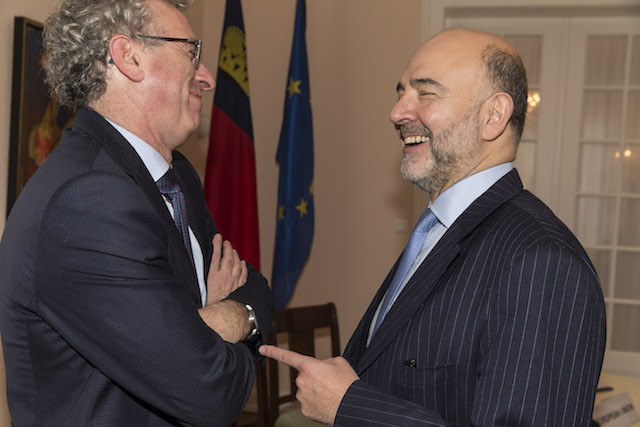On Thursday, Pierre Moscovici, the EU’s finance commissioner, said Luxembourg and six other EU countries were still engaged in “aggressive tax planning” that undermined the “level playing field in our internal market”.
Moscovici made the remarks as part of his presentation of the European Semester, the European Commission’s annual review of member state budgets that aims to coordinate economic policies across the bloc.
Speaking at a press conference with Donald Tusk, the European Council president, in Luxembourg, Bettel said later on 7 March:
“The European Union is not used to pointing fingers at countries without prior discussion. We’ve accomplished so many things in four years of this government, we have come off every possible list. If the objective of European tax harmonisation is to raise taxes, then thousands of jobs are at risk, because businesses will then go to the United States.”
Moscovici apparently took issue with the reference to “prior discussion”, writing on Twitter that he was:
“Surprised by the astonishment of my friend @Xavier_Bettel on the @EU_Commission position on tax matters! The reports published yesterday were sent to all member states 2 weeks ago for comments: [which] they all did. Transparency still has a way to go.”
In response, Gramegna tweeted:
“Dear Pierre, transparency is not an end in itself and we must know how to take into account the legitimate and well-founded observations of [member] states. Taxation has no place in the European Semester. PG”
Several hours prior to his reply to Moscovici, Gremegna had tweeted:
“Considerable progress has been made in recent years in tax matters. We should continue with this constructive approach instead of making unjustified reproaches against a limited number of member states as part of the European Semester.”
Gramegna subsequently retweeted a photo of himself with the head of the OECD, the thinktank that is spearheading the “Beps” campaign to harmonise global corporate taxation. Luxembourg’s finance ministry had tweeted on 7 March:
“Excellent exchange of views between Ángel Gurría and @pierregramegna on the future of multilateralism, digital taxation and the enlargement of the #OECD in Paris.”
